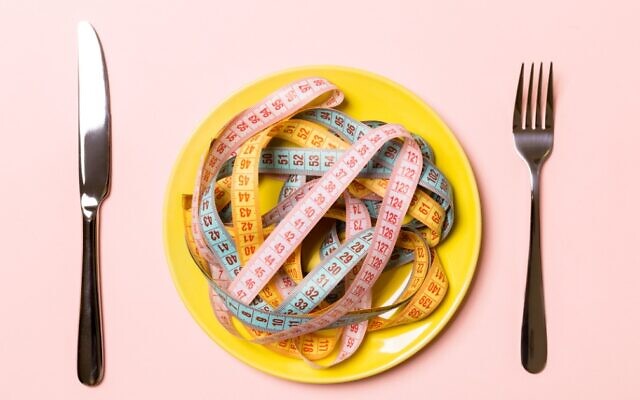OPINION: An eating disorder can be a lifelong struggle
'I wish I had the choice to eat as most people do and not to succumb to terror and self-destructive feelings at mealtimes,' writes Celia Fridzon
Chocolate ice-cream, crème brûlee? My favourites! How wonderful that your reporter, Michelle Rosenberg, enjoys them too. Her writing is lovely and I have nothing but praise for her attitudes to food, and to women’s bodies.
And her pride in refusing to be cowed by the comments of others, and in refusing to let the woman sipping green tea keep her from her dessert, is justified.
But at this time, the season of our freedom, she may want also to be grateful for the freedom that she enjoys to eat as she pleases; and she may want to spare a thought for women who would love to enjoy a tiramisu or a banoffee pie but for whom death by chocolate can feel rather too literal.
The eating disorders charity Beat estimates that more than a million people in this country are struggling with an eating disorder. The majority of them are women and girls. Their problems with food are not something they did to themselves by reading too many fashion magazines or by listening to people who think a cup of tea is a dessert, or a meal (although the occasional model or actress who articulates attitudes like these don’t help).
Their anxieties around food and weight almost always stem from difficult family dynamics, or from deep-seated personal problems, including miserably low self-esteem.
In some cases these women, or men, become a kind of scapegoat for their family’s dysfunction. Many find it enormously difficult to overcome the eating disorder, or to stop it becoming a way of coping. After all, there’s no way to go teetotal with food: eating is something we all need to do, to the right degree, several times a day, every day of our lives.
But some recovery is limited, and people with an eating disorder can struggle with anxiety around food for the rest of their life. I’m one of those women.
When compared with mental illness generally, eating disorders are among the most deadly. Anorexia has been shown to have has the highest mortality rate of any psychiatric disorder, with studies showing 20% of sufferers will die prematurely.
And looking at Jewish sufferers, research in Canada has shown that adolescent Jewish females (but not males) appear to be at greater risk for abnormal attitudes and behaviours related to eating, compared with non-Jewish female peers. The reasons for this are unclear.
Amy Winehouse’s younger brother has been quoted as saying that what really killed the singer in 2011 at the age of 27 was not her problem with alcohol or drugs but the bulimia she had suffered from since childhood.
Recovery is, of course, possible. Some people, especially those with early-onset illness, can be free of it almost entirely. But for others recovery is limited, and people with an eating disorder can struggle with anxiety around food for the rest of their life.
I’m one of those women. I wish I had the choice to let my anxieties go: to eat as most other people do and not to succumb to terror and self-destructive feelings at mealtimes. With the strongest will in the world, and having read almost everything I can on the subject, I have found it impossible to shake it off. Happily, I am well past the stage where it was controlling my life. But the process of developing anorexia nervosa was not one that felt fully reversible.
It’s now more than twenty years since I was an inpatient on an eating disorders ward, at a Victorian hospital in London. That experience was, in itself, nightmarish. Even now there are days in the week when food dominates my thoughts and behaviour. I find myself avoiding meals with other people, and I wish more than almost anything I could have a more normal attitude to food and weight. So Michelle’s advice to eat up is all well and good but feels rather simplistic – a bit like telling someone with a badly sprained ankle to throw away their crutch and just run.
Eating disorders can be inherited too. I’m happy that my daughters have a healthy attitude towards food – not least desserts – and don’t seem to be following in my footsteps. May all of us, and our daughters, and sons, be free of struggles with food and may as many of us as possible have the healthy attitude Michelle has. Wishing all readers a season of freedom from anxiety about food and weight, and a Pesach Sameach.

Thank you for helping to make Jewish News the leading source of news and opinion for the UK Jewish community. Today we're asking for your invaluable help to continue putting our community first in everything we do.
For as little as £5 a month you can help sustain the vital work we do in celebrating and standing up for Jewish life in Britain.
Jewish News holds our community together and keeps us connected. Like a synagogue, it’s where people turn to feel part of something bigger. It also proudly shows the rest of Britain the vibrancy and rich culture of modern Jewish life.
You can make a quick and easy one-off or monthly contribution of £5, £10, £20 or any other sum you’re comfortable with.
100% of your donation will help us continue celebrating our community, in all its dynamic diversity...
Engaging
Being a community platform means so much more than producing a newspaper and website. One of our proudest roles is media partnering with our invaluable charities to amplify the outstanding work they do to help us all.
Celebrating
There’s no shortage of oys in the world but Jewish News takes every opportunity to celebrate the joys too, through projects like Night of Heroes, 40 Under 40 and other compelling countdowns that make the community kvell with pride.
Pioneering
In the first collaboration between media outlets from different faiths, Jewish News worked with British Muslim TV and Church Times to produce a list of young activists leading the way on interfaith understanding.
Campaigning
Royal Mail issued a stamp honouring Holocaust hero Sir Nicholas Winton after a Jewish News campaign attracted more than 100,000 backers. Jewish Newsalso produces special editions of the paper highlighting pressing issues including mental health and Holocaust remembrance.
Easy access
In an age when news is readily accessible, Jewish News provides high-quality content free online and offline, removing any financial barriers to connecting people.
Voice of our community to wider society
The Jewish News team regularly appears on TV, radio and on the pages of the national press to comment on stories about the Jewish community. Easy access to the paper on the streets of London also means Jewish News provides an invaluable window into the community for the country at large.
We hope you agree all this is worth preserving.






















